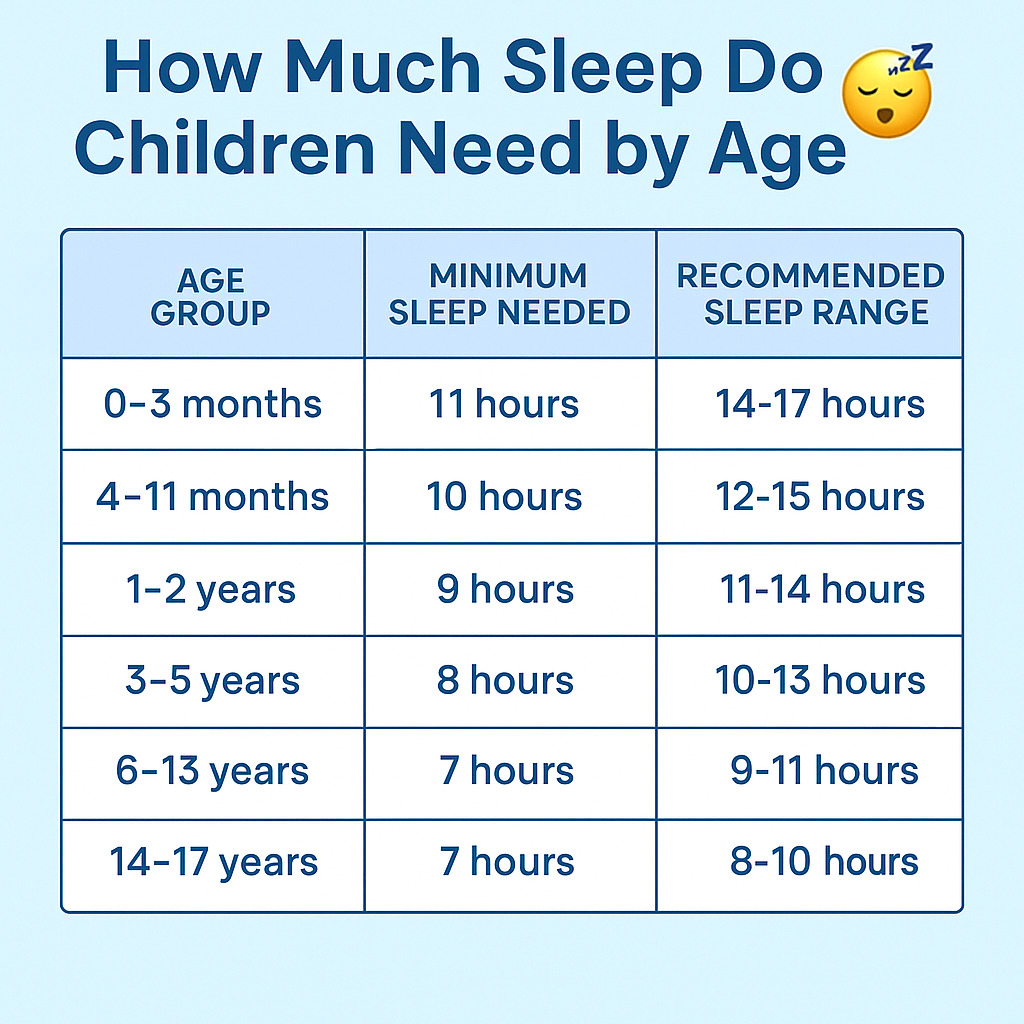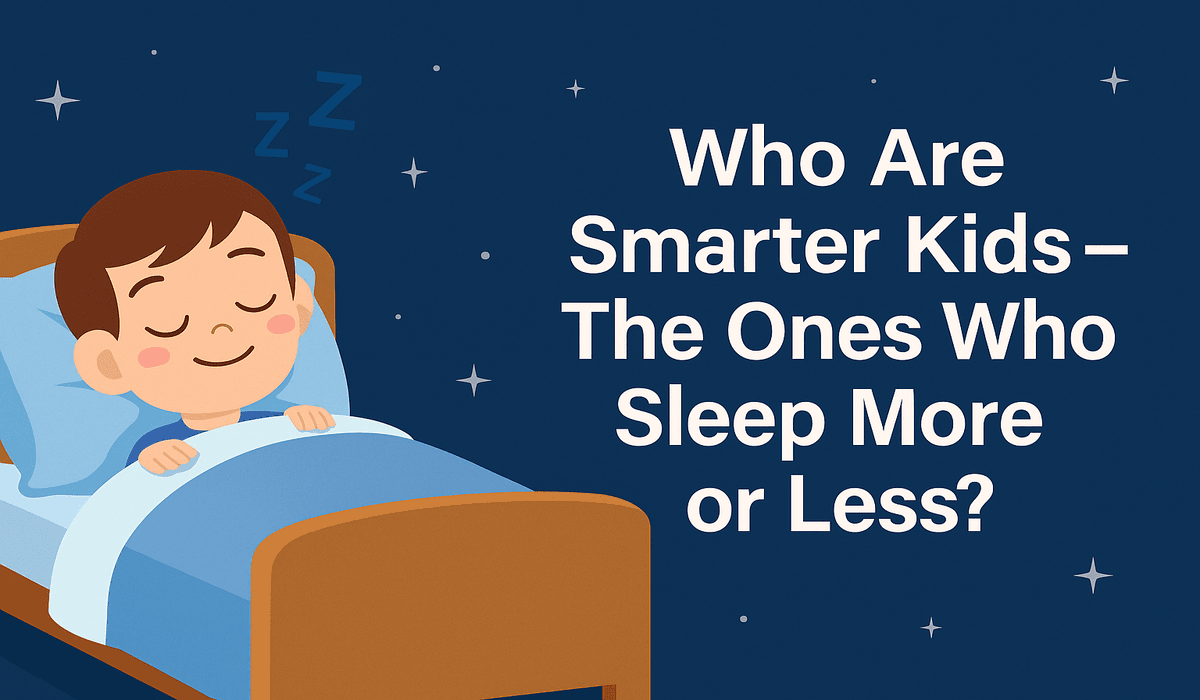How Much Sleep Do Kids Really Need at Different Ages?
Some children sleep more, some less — but did you know that the amount of sleep your child gets can affect their brain development, academic performance, and thinking skills? Here’s what sleep guidelines say for each age group.
Does Sleeping Less or More Make a Child Smarter?
You might wonder — what does sleep have to do with intelligence? Some people believe that kids who sleep more are lazy, while those who sleep less are more active and smart. But according to doctors and sleep experts, the truth is more balanced.
Sleep directly affects a child’s brain development, memory, learning ability, and emotional health. Children who don’t get enough sleep may face trouble focusing in class, remembering what they learn, and handling stress. On the other hand, oversleeping can lead to low energy levels, irritability, and poor daily performance.
The key is not how much sleep, but the right amount of quality sleep based on the child’s age. A proper sleep schedule helps improve thinking skills, problem-solving ability, and attention span — all signs of intelligence.
Why Children’s Sleep Patterns Worry Parents
These days, many parents are concerned about their child’s sleep habits. Some say their child stays awake late at night and doesn’t nap during the day, while others complain that their child sleeps too long in the morning and struggles to wake up for school.
According to doctors, this is quite common and not always a sign of a health problem. Children need different amounts of sleep at different ages, and as they grow older, their sleep patterns change. A toddler may need 12–14 hours of sleep, while a teenager may function well with 8–10 hours.
Lack of proper sleep can affect a child’s mood, focus, memory, and performance in school. On the other hand, oversleeping may make them feel tired and lazy. That’s why understanding the right amount of sleep for your child’s age is very important for their mental and physical development.
A consistent sleep schedule, a calm bedtime routine, and limiting screen time before bed can help children sleep better and stay more alert during the day.
How Much Sleep Do Kids Really Need? Here’s What Experts Say
According to the guidelines shared by the Indian Academy of Pediatrics, young children need more sleep because their sleep is often interrupted. Babies and toddlers wake up frequently during the night, so they require longer sleep durations to feel rested.
As children grow older, their sleep needs naturally decrease. However, getting enough good-quality sleep at every age is very important for healthy growth, brain development, and overall well-being.
Doctors say that sleep is just as important as a balanced diet and exercise for kids. Without proper rest, children may struggle with mood swings, poor concentration, and weak immunity.
💤 How Much Sleep Do Children Need by Age?
Getting the right amount of sleep is essential for your child’s brain development, focus, energy, and overall health. According to pediatric experts, children need different sleep durations based on their age.
Here’s a simple sleep chart every parent should know:

✅ Tip for Parents: If your child is often tired, cranky, or finds it hard to concentrate, their sleep routine might need adjusting. Try setting a regular bedtime and limit screen time before sleep.
What Sleep Guidelines Say About Kids’ Health
Experts explain that children need a certain amount of sleep at each age to support brain development, focus, and emotional well-being. The sleep chart shows the minimum sleep needed, but there’s no need to worry if your child sleeps more—as long as it stays within the healthy sleep range.
For example, if your 5-year-old sleeps for 13 hours, that’s still considered perfectly normal and healthy. In fact, proper sleep improves memory, learning, mood, and growth in children.
Lack of sleep, on the other hand, may lead to trouble concentrating, mood swings, weaker immunity, and even slower development. That’s why building good sleep habits early is one of the best things you can do for your child’s health and success.
Which Kids Are Smarter? The Truth About Sleep and Intelligence
In many Indian households, 8–9 hours of sleep is seen as enough for children. If a child sleeps more than that, they’re often labeled as lazy or scolded for “oversleeping.” Even school-going children aged 10–12 are sometimes criticized for sleeping too much.
But according to experts and pediatric sleep guidelines, the truth is different. Children who sleep less than the recommended hours for their age may face serious issues. Lack of sleep can affect their mood, make them irritable, and reduce their ability to learn new things.
Studies show that kids who don’t get enough rest struggle with focus, memory, and academic performance. They find it harder to concentrate in class, retain what they learn, and stay mentally active throughout the day.
Not just that — in older children and teens, sleep deprivation increases the risk of accidents and injuries.
That’s why getting the right amount of sleep at every age is not just healthy — it may also make your child smarter, calmer, and more successful in school and life.
So, Is It Okay If Your Child Sleeps More Than 8 Hours?
Yes! If your child sleeps more than 8 hours a day and their sleep fits within the recommended range for their age, there’s no need to worry. In fact, it’s a good sign for both their physical and mental development.
Proper sleep helps children grow better, stay emotionally balanced, and perform well in daily activities. Kids who get enough rest often do better in sports, creative hobbies, and schoolwork.
They wake up feeling fresh, stay more focused during the day, and learn new things more easily. So don’t rush to wake your child up early if they’re sleeping well — their brain and body are growing while they rest!

